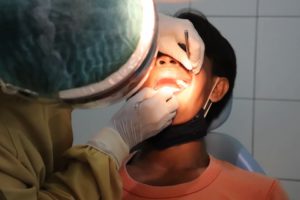06 Dec What Is Tartar and How Can You Remove It?
 Tartar is a common health issue that affects your teeth. It’s also known as “calculus.” Tartar forms on your teeth and can also penetrate the gum line. You may be able to feel tartar on your teeth with your tongue and it can lead to more serious issues like bad breath or gum disease.
Tartar is a common health issue that affects your teeth. It’s also known as “calculus.” Tartar forms on your teeth and can also penetrate the gum line. You may be able to feel tartar on your teeth with your tongue and it can lead to more serious issues like bad breath or gum disease.What causes tartar?
Tartar is usually caused by food and drink. If you don’t brush your teeth regularly, a substance called “plaque” begins to form. In less than a day, this substance can change from plaque, which is soft, sticky and easy to remove, to tartar, which is harder and more difficult to remove.
The ADA recommends brushing your teeth twice daily (for at least two minutes each time) and flossing at least once daily. These helps wash away plaque and prevents tartar buildup.
What are the signs of tartar buildup?
Tartar buildup is sometimes visible to the naked eye. You may also be able to feel it on your teeth. In fact, though tartar leads to numerous health concerns, many patients are more concerned with the cosmetic effects of tartar.
If you have tartar, you may notice brown or yellow stains on your teeth. You may also have bad breath due to bacteria. Because tartar can break down your tooth enamel, your teeth may feel sensitive and you may feel discomfort when you eat cold or hot foods or beverages. Excessive tartar often leads to tooth decay or cavities.
If tartar builds up along the gum line, you may develop gum disease.
How can you remove tartar?
While you can remove plaque at home with a toothbrush, toothpaste, and floss, only a dental professional should remove tartar. A dentist or dental hygienist can use a tool called a “scaler” to remove tartar from your teeth. If the tartar caused tooth decay, a dentist may recommend a filling or root canal to remedy the issue.
You can also schedule regular dental cleanings to prevent tartar buildup. Most dental professionals recommend professional cleanings every six months. If you have dry mouth or aren’t able to brush your teeth daily, you may need professional cleanings more often to prevent tartar buildup.
If you suspect you have a cavity or tartar buildup, schedule an appointment with a Dallas dentist for treatment.
Content found on this blog is intended for educational purposes only and should not be used as a substitute for professional judgement, advice, diagnosis, or treatment. Please speak with a professional if you have concerns about your oral health.
